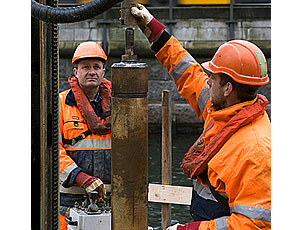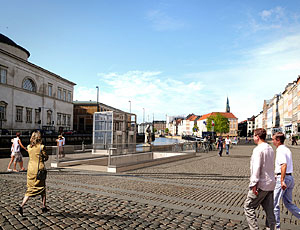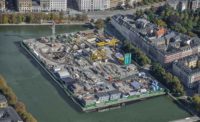Four big consortiums are due next month to begin calculating bids for the estimated $1.9 billion of tunneling work on the next 15.5-kilometer underground extension of Denmark’s Copenhagen metro, the Cityringen line. As arbitrators continue grappling with $385 million in claims for extra payment over the system’s seven-year-old first phase, Copenhagen officials plan to start work on Cityringen by next summer. By bidding construction of Cityringen’s 17 stations separately from the tunneling work, project owner Metroselskabet hopes to avoid the sort of dispute that reportedly impeded progress on early phases, says procurement project manager Jens Gravgaard.


Metroselskabet next month will invite four consortiums to submit design-build bids for two tunneling contracts, setting a spring 2010 submission deadline. As with the metro’s first phase, the owner has opted for design-build, says Gravgaard. However, “We still want to maintain full control of everything that faces the passenger,” he adds.
While the phase-one contractor, the multinational COMET consortium, was responsible for the stations, Metroselskabet now will procure that element separately on Cityringen. Delays over station design in the first phase are understood to form part of the continuing claim. COMET won that design-build contract, including 8.3 km of twin tunnels, in late 1996.
The owner wanted “to be involved in every detail, particularly the architecture,” alleged COMET’s engineering manager Simon O’Hana at the time.
Metroselskabet will invite design-build bids in two or three years for Cityringen’s stations, budgeted at about $155 million, says Gravgaard. The tunneling consortiums will manage the station teams as nominated subcontractors for a fee.
Metroselskabet has divided tunneling work into the southern and northern halves, to reflect differing ground conditions and likely construction methods, says Gravgaard.
In May, locally based joint venture GEO-Aarsleff completed around $19 million of site investigations, having started in 2007. The investigation’s scope grew from 350 planned boreholes to around 500 because information in the north “was very scarce,” says Gravgaard.
Soil conditions in the southern half, largely in limestone, are similar to those in the metro’s first phase, says Michael Bindseil, project manager of the owner’s design-firm consortium. The northern stretch will run through a clay/till mix, which is more liable to settlement, he adds.
Both slurry-type tunnel-boring machines and earth-pressure balance machines are likely to be used on tunnels. But the choice of TBMs will be the contractor’s, adds Bindseil. Bindseil’s local design firm Cowi A/S, with London-based Arup Group and France’s Systra S.A., Paris, are jointly responsible for conceptual design, bid evaluation and construction monitoring.
Among teams prequalified to bid for the tunnels is one including Austria’s Salzburg-based Alpine Bau GmbH, with its Spanish owner FCC Construcción S.A., Madrid.
Bilfinger Berger Ingenieurbau GmbH, Wiesbadem, Germany, has joined up with Paris-based Vinci Construction Grand Projets and local contractor Per Aarsleff A/S.
A third team includes locally based M.T. Højgaard A/S and E. Pihl og Søn, along with Germany’s Hochtief Construction AG, Essen, and Ed. Züblin AG, Stuttgart.
An Italian consortium of Rome-based Salini Construttori S.p.A. and S.E.L.I. Società Esecuzione Lavori Idraulici S.p.A., with Tecnimont S.p.A., Milan, is also in the running.
Cityringen is the metro’s third line, forming a 15.5-km loop. The line will comprise twin 4.9-meter internal diameter tunnels about 20 m below ground. The project is due for completion in 2018.





























































Post a comment to this article
Report Abusive Comment